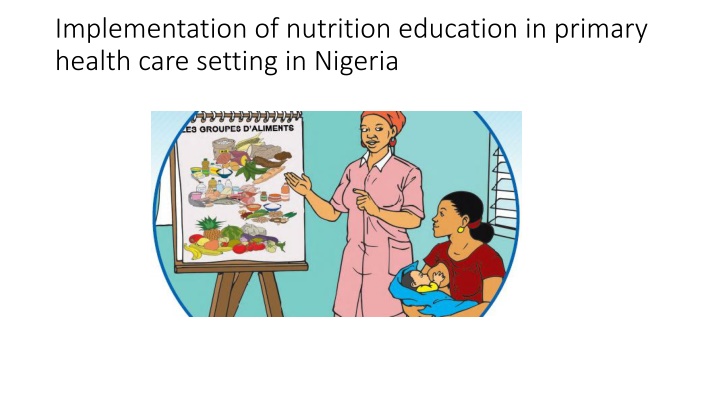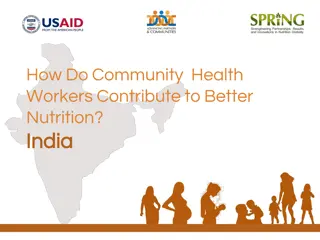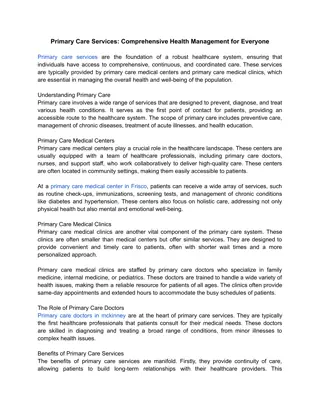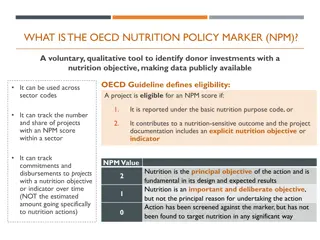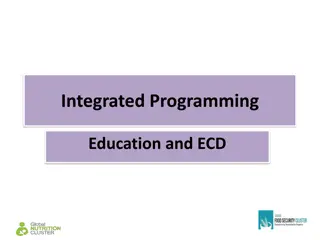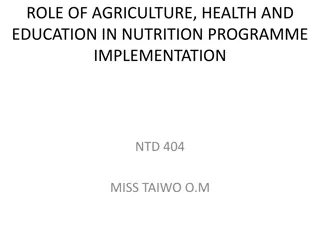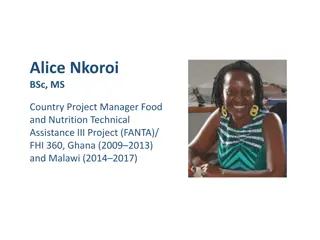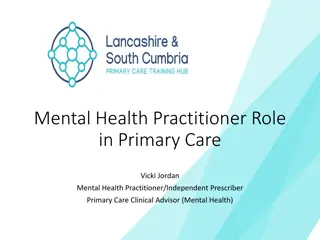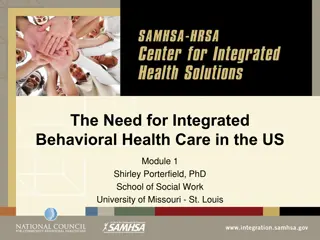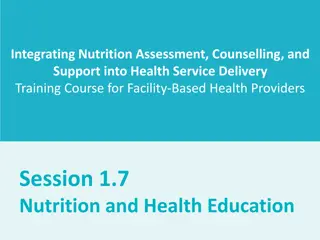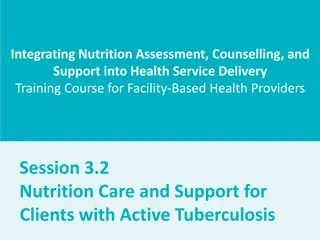Implementation of Nutrition Education in Primary Health Care Setting in Nigeria
Primary health care (PHC) in Nigeria emphasizes the essentiality of practical, scientifically sound, and socially acceptable methods to provide accessible health services to individuals and families. It integrates nutrition education to address prevalent health issues through promotive, preventive, curative, and rehabilitative services. The Alma-Ata Declaration underscores the significance of PHC, highlighting its role in promoting health equity, community participation, and sustainability with a focus on self-reliance and self-determination.
Download Presentation

Please find below an Image/Link to download the presentation.
The content on the website is provided AS IS for your information and personal use only. It may not be sold, licensed, or shared on other websites without obtaining consent from the author.If you encounter any issues during the download, it is possible that the publisher has removed the file from their server.
You are allowed to download the files provided on this website for personal or commercial use, subject to the condition that they are used lawfully. All files are the property of their respective owners.
The content on the website is provided AS IS for your information and personal use only. It may not be sold, licensed, or shared on other websites without obtaining consent from the author.
E N D
Presentation Transcript
Implementation of nutrition education in primary health care setting in Nigeria
PRIMARY HEALTH CARE (PHC): Is the essential care based on practical, scientifically sound and socially acceptable method and technology made universally accessible to individuals and families in the community through their full participation and at a cost they and the country can afford to maintain in the spirit of self reliance and self determination. Primary health care reflects and evolves from the economic conditions and sociocultural and political characteristics of the country and its communities. It addresses the main health problems in the community providing promotive, preventive, curative and rehabilitative services. It includes education concerning prevailing health problems and the methods of preventing and controlling them. It involves, in addition to the health sector, all related sectors and aspects of national and community development example, Agriculture, education housing etc.
Features of Primary Health Care S/N Features of PHC Quotation from Alma Ata declaration 1 An element of health system Primary health care.. It forms an integral part of the country s health system. It is the first level of contact of individuals, the family and the community with the national health system bringing health care as close as possible to where people live and work. 2 Focus on priorities essential health care 3 Scientific basis .based on scientifically sound 4 Culture sensitivity .socially acceptable methods and technology . 5 Equity .made universally accessible to individuals and families in the community . 6 Community participation .Through their full participation . 7 Sustainability and self- reliance ..at a cost that the community and country can afford to maintain at every stage of their development in the spirit of self- reliance and self-determination.
Alma-Ata International conference An international Conference on Primary Health Care (PHC) was held in Almaty (formerly Alma-Ata), Kazakhstan (formerly Kazakh Soviet Socialist Republic) on 6 12 September 1978. It expressed the need for urgent action by all governments, all health and development workers, and the world community to protect and promote the health of all people. An international declaration (Alma-Ata Declaration) underlining the importance of primary health care was made at the conference. The primary health care approach has since then been accepted by member countries of the World Health Organization (WHO) as the key to achieving the goal of "Health For All" but only in developing countries at first. This applied to all other countries five years later. The Alma-Ata Declaration of 1978 emerged as a major milestone of the twentieth century in the field of public health, and it identified primary health care as the key to the attainment of the goal of "Health for All" around the globe.
ALMA ATA DECLARATION ON PRIMARY HEALTH CARE Health is a fundamental human right and that the attainment of the highest possible level of health is a most important world wide social goal. The existing gross inequality in the health status of the people particularly between developed and developing countries is politically, socially and economically unacceptable. Economic and social development, based on a new international economic order is of basic importance to the fullest attainment of health for all. The people have the right and duty to participate individually and collectively in the planning and implementation of their health care. Government have a responsibility for the health of their people which can be fulfilled only by the provision of adequate health and social; measures. All government should formulate national policies, strategies and plans of action to launch and sustain primary health care. All countries should cooperate in a spirit of partnership and service to ensure PHC for all people. An acceptable level of health for all the people of the world by the year 2000 can be attained through a further and better use of the world s resources.
BASIC PRINCIPLES OF PRIMARY HEALTH CARE These include: Community participation Intersectoral collaboration Integration of health care programmes Equity Self-reliance
COMMUNITY PARTICIPATION Community participation is a process by which individuals and family assume responsibility for their own health and those of the community and develop the capacity to contribute to their/and the community development. Participation can be in the area of identification of needs or during implementation. The community needs to participate at village, ward, district or local government level. ADVANTAGES OF COMMUNITY PARTICIPATION -It addresses the felt health needs of the people -It ensures social responsibility among the community -It ensures sustainability -It ensures cost sharing -It ensures enhancement of knowledge -It encourages intersectoral collaboration (the coordination of health activities with other sectors e.g Education, Finance, Agriculture, Information etc)
INTER SECTORAL COLLBORATION This is the coordination of health activities with other sectors; such sectors include Education, Finance, Agriculture, Information etc. There should be a working relationship these bodies and the health ministry. ADVANTAGES -Overall human development -It ensures economic development -It ensures affordability
INTEGRATON OF HEALTH SERVICES This is defined as coordination of various primary health care components into a whole programme and made available at all times. ADVANTAGES -It ensures efficient use of all resources and removes areas of wastage. -It ensures sustainability of programme -It ensures bye pass phenomenon -It reduces opportunity cost -It guarantees clients confidentiality
EQUITY The health care resources available in a given community should not be in the custody of a few, all resources should be accessible and affordable to all. Addressing the issue of equity in Nigeria involves: Decentralization of health services into federal/ state/local government-ward levels. The essential drug services and the national drug formulae making drugs available at all levels and at low cost. Implementation of National health insurance scheme-where people contribute to the health services of those who don t have or cannot afford.
SELF RELIANCE This involves the use of technological methods maintained by the community . It can be in terms of human resources (medical officers, community health workers, nurses, midwives), money or materials (physical facilities, drugs). ADVANTAGES OF SELF RELIANCE -Affordability -Sustainability -Acceptability -Authenticity
COMPONENTS OF PRIMRY HEALTH CARE There are 8 components (elements)of primary health care. Immunization :An increasing number of infectious diseases can be prevented by vaccinations example-measles, Meningitis, tuberculosis, yellow fever etc Maternal and child care: Pregnant women and women of child bearing age (15-49 years) are the target group for special care. Children under 5yrs of age are also vulnerable to childhood killer disease. Maternal and child health clinics are established in Nigeria to take care of these groups. Essential drugs : The most vital drugs should be available and affordable at all levels. Food and Nutrition: The family s food should be adequate, affordable and balanced in nutrients. Education: The community should be informed of health problem and methods of prevention and control. Illness and injury: Adequate provision of curative services for common ailments and injuries should be made by the community. Water and sanitation :A safe water supply and the clean disposal of wastes are vital for health. Vector and reservoirs :Endemic infection diseases can be regulated through the control or eradication of vectors and animal reservoir.
PROBLEMS OF IMPLEMENTATION OF NUTRITION EDUCATION IN PRIMARY HEALTH CARE PROGRAMME IN NIGERIA. To achieve primary health care in Nigeria, Nigeria was divided into wards of 10.000 people. This ward is the same as political ward that makes up districts and then local governments. However problems experienced during implementation of Nutrition education in primary health care in Nigeria include the following: 1. Shortage of funds 2 Lack of materials and equipment 3. Shortage of Trained staff 4. Lack of commitment which can be at the individual or government level. 5. Lack of incentive 6. Inadequate community participation 7. Rapid turnover of policy makers 8. Lack of manpower training and development 9. In appropriate staff recruitment
